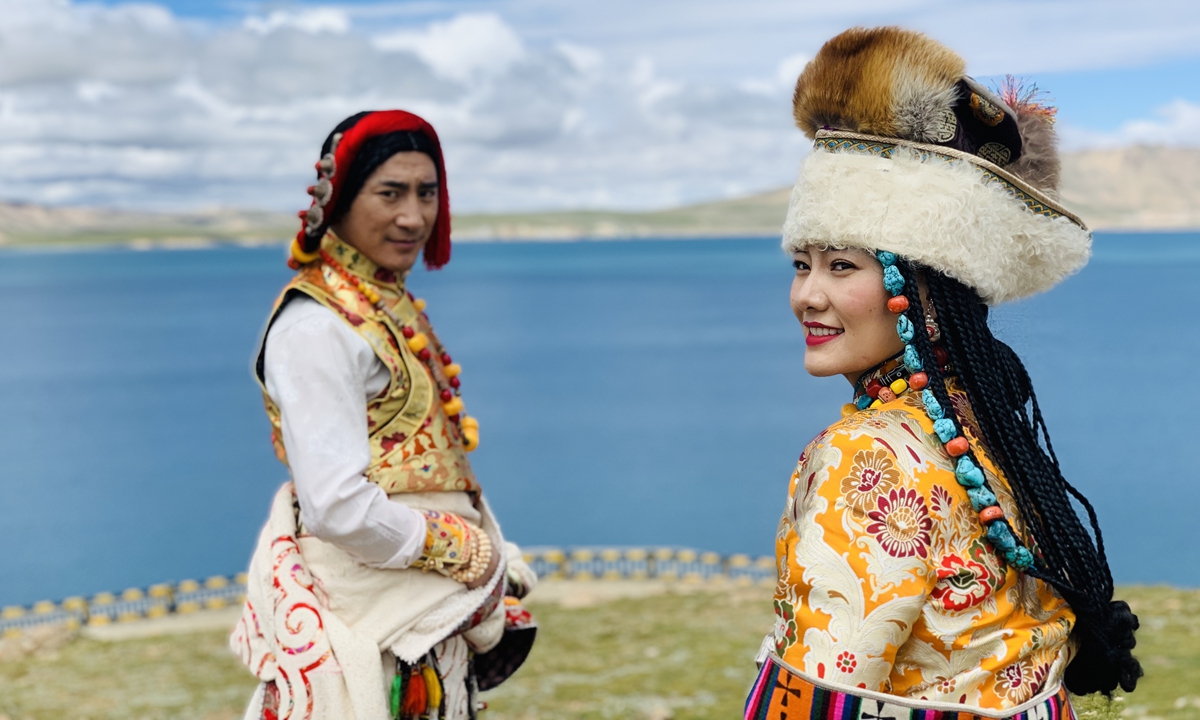ARTS / CULTURE & LEISURE
Folk inheritor to continue promoting intangible cultural heritage Layi

Nimaluosang, an inheritor of Layi, and her husband Gejie Photo: Courtesy of Nimaluosang
During a recent concert marking the 72nd anniversary of the peaceful liberation of Xizang held in Beijing, Nimaluosang, one of the inheritors of China's national intangible cultural heritage known as Layi, and her husband sang famous Tibetan folk songs. Their performance was described as "exciting and excellent."
"We were so honored to sing Layi in front of so many people during the concert and introduce to more people our ancient heritage that has been passed down for generations," Nimaluosang told the Global Times.
An ethnic group's spirit
Layi, a type of folk song that mainly focuses on romantic stories, is very popular in Northwest China's Qinghai Province, Gansu Province, Southwest China's Sichuan Province and the Xizang Autonomous Region. It has a long history that follows the development of the Tibetan people, and is mainly influenced by Tibetan Buddhism and the ethnic group's half-agriculture, half-nomadic culture.
Layi bears unique and important cultural value with its expressive music. For this reason, it was listed as a national intangible cultural heritage in 2006.
According to Nimaluosang, songs mainly highlight young love and the need to respect young people's pursuit to love freely. At the same time, their songs reflect severe and harsh criticism of parental interference with this pursuit.
The lyrics of Layi touch on all aspects of love. Songs are often sung in an alternating, antiphonal manner, and tend to follow the structure of a lead in, a greeting, the time of falling in love, the time of being in love, being lovesick, a betrayal and a breakup.
"The lyrics are different but their tunes are similar," said Nimaluosang.
The tunes of Layi also fall into different categories depending on region, with some emphasizing the lyrics and intense pace of the music, while others emphasize the depth of melody and the free and melodious nature of these mountain songs, and still some others show off a sweetness of melody and evenness of rhythm, demonstrating the elegant and lyrical nature of the music.
Living in Nagqu Prefecture, Xizang Autonomous Region, Nimaluosang said the Layi in the prefecture has more trills than the tunes in Qinghai Province, which is very hard to achieve.
Besides romance, Layi also praises nature and parents, with more sonorous tunes accompanying these themes.
Better inheritance
"In the Nagqu Prefecture, someone who cannot sing folk songs does not deserve the title of singer," Gejie, Nimaluosang's husband, told the Global Times.
"Being good at singing Layi is quite challenging as getting the trill right is very difficult to master," said Gejie, recalling that he often practiced singing in the mountains during the COVID-19 pandemic and that it usually took two months to master a single song.
According to the couple, anyone can learn to sing Layi so long as they have the interest. However, "if you want to be a cultural inheritor, you should have a good voice."
Meanwhile, being an inheritor requires people to master a lot of singing techniques and memorize a lot of lyrics.
"When I was a little kid, I could hear people singing folk songs while herding sheep in the mountains. I also heard a lot of Layi songs from my grandparents," said Nimaluosang.
Most of the lyrics have been passed down from one generation to the next, while the lyrics to some other songs are totally improvised. One of the ways new students learn is to pay a visit to an elder's home and listen to them sing.
"One of the reasons that Layi can be passed down to today is because it is capable of 'keeping up with the times,' both in terms of lyrics and tunes, but we still keep some original songs from the ancients," said Nimaluosang.
Currently, Nimaluosang has eight apprentices, many of whom are young learners who are very passionate to learn Layi from her. She said that she has been very pleased to see that more young people in Xizang are showing an interest in the traditional art form.
In order to allow more people to learn about these folk songs, the couple started to share their videos on social media platforms such as Douyin, Kuaishou and Sina Weibo. Some of their videos have gotten more than 28 million views.
Together the couple is known as the "New Shepherd team." The two explained that, just like a shepherd, they want to continue nudging people toward the art form in the new era.
"We hope one day we have the opportunity to perform Layi abroad so that more people can enjoy the charm of our ethnic culture," she said.




